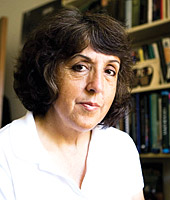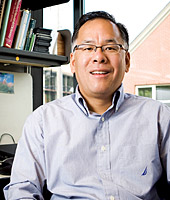New Academic Programs Take a
Global View
Student interest on the increase

Kathleen Braden says that as an urban center and major port, Seattle is well positioned for global involvement. |
Two new academic offerings at Seattle Pacific have emerged directly from the University’s signature commitments to understand what is going on in the world and to practice radical reconciliation in the world. The first is an interdisciplinary undergraduate major in global development studies. The second is a social enterprise concentration for economics majors in the School of Business and Economics.
Students who enroll in the global development studies major discover new tools for global outreach that exist alongside traditional modes of evangelism, Bible translation, and church planting. These include business and financial management acumen, international political and geographic insight, and leadership and public-policy skills informed by Christian faith and tradition.
“The major is a way for students to gain the education and training needed to go into the world of nonprofit work on behalf of the human family,” says Professor of Geography Kathleen Braden, who leads the new program along with Associate Professor of Political Science Ruth Ediger and Professor of Political Science Douglas Durasoff. “The new global reality is that Christian non-governmental organizations are stepping up to the plate as initiators of social and political change.”
The 61-credit global development studies major — one of only a few of its kind among Christian universities — grew out of a desire among SPU students for vocations that allow them to make a cross-cultural impact. “This is a generation engaged with the world,” notes Braden. “They tend to have international travel experience, and they are globally conscious and passionate about making a difference.”
One significant component of the program is a required internship with a local, national, or international organization — designed to equip students to address world-sized needs. For junior Lisa Anderberg, who researched viable internship sites for Braden to cultivate, the strength of the new major is the broad base of knowledge and practical skill it offers. “No one academic area alone can address world problems,” she says. “I know I want to spend my life working to end poverty. This major is the first step in helping me figure out how.”

Kenman Wong highlights businesses that not only increase shareholder value, but do social or environmental good. |
For Kenman Wong, professor of business ethics at SPU, one of the central goals of the School of Business and Economics’ new social enterprise concentration is “to bring the full meaning of shalom, which includes reconciliation, to our neighbors everywhere through economic empowerment.”
The new concentration, also rare among Christian universities, was created in response to surging student interest in the intersection of business and worldwide social responsibility. “Students are coming to us with a stronger social conscience,” says Wong. “They have a passion for using their business skills to help solve social problems.” Courses in the new concentration include emphases in microfinance, social venture planning, and community economic development.
One effective way of assisting poor communities to become self-sustaining is to help them begin and operate small-business enterprises. Increasingly, this is accomplished through microloans to the self-employed poor, who would otherwise have no access to standard bank loans. The SPU Microfinance Initiative is in the process of raising $5,000 in private donations to establish such a community bank in the Dominican Republic through the Christian nonprofit agency Hope International. The project is now 70 percent funded. Senior economics major Jason Williams interned with Hope this past summer.
Wong says that within extended families, small loans to as few as 30 enterprising women can benefit 200 people. “It’s a revolutionary way to combat poverty,” he says. And it’s a way in which Seattle Pacific students learn how to apply their education for the benefit of humanity.
—Photo by Luke Rutan
Return to top
Back to Campus Home
|